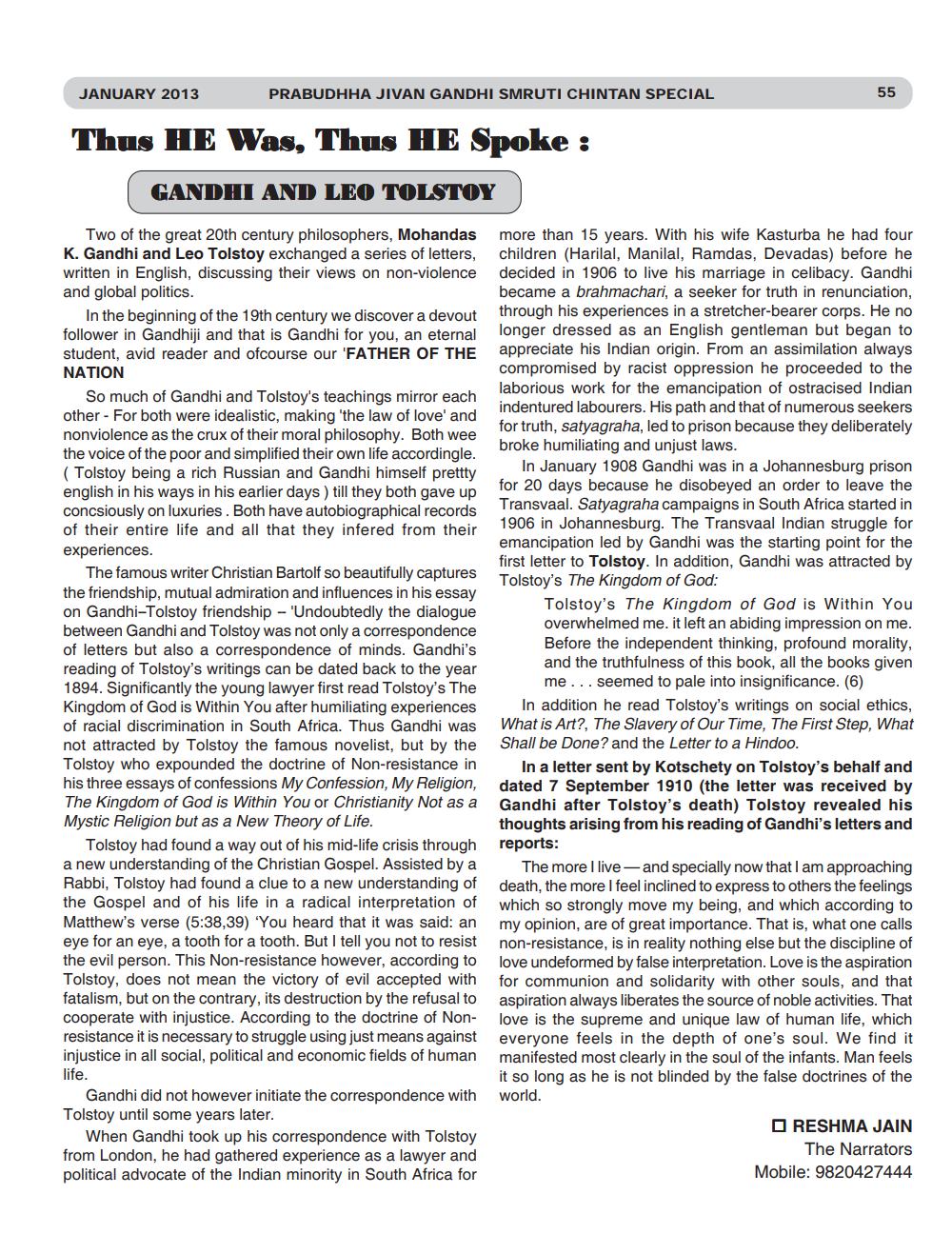________________
JANUARY 2013
PRABUDHHA JIVAN GANDHI SMRUTI CHINTAN SPECIAL
Thus HE Was, Thus HE Spoke :
GANDHI AND LEO TOLSTOY
Two of the great 20th century philosophers, Mohandas K. Gandhi and Leo Tolstoy exchanged a series of letters, written in English, discussing their views on non-violence and global politics.
In the beginning of the 19th century we discover a devout follower in Gandhiji and that is Gandhi for you, an eternal student, avid reader and ofcourse our 'FATHER OF THE NATION
So much of Gandhi and Tolstoy's teachings mirror each other - For both were idealistic, making 'the law of love' and nonviolence as the crux of their moral philosophy. Both wee the voice of the poor and simplified their own life accordingle. (Tolstoy being a rich Russian and Gandhi himself prettty
english in his ways in his earlier days) till they both gave up concsiously on luxuries. Both have autobiographical records of their entire life and all that they infered from their experiences.
The famous writer Christian Bartolf so beautifully captures the friendship, mutual admiration and influences in his essay on Gandhi-Tolstoy friendship - 'Undoubtedly the dialogue between Gandhi and Tolstoy was not only a correspondence of letters but also a correspondence of minds. Gandhi's reading of Tolstoy's writings can be dated back to the year 1894. Significantly the young lawyer first read Tolstoy's The Kingdom of God is Within You after humiliating experiences of racial discrimination in South Africa. Thus Gandhi was not attracted by Tolstoy the famous novelist, but by the Tolstoy who expounded the doctrine of Non-resistance in his three essays of confessions My Confession, My Religion, The Kingdom of God is Within You or Christianity Not as a Mystic Religion but as a New Theory of Life.
Tolstoy had found a way out of his mid-life crisis through a new understanding of the Christian Gospel. Assisted by a Rabbi, Tolstoy had found a clue to a new understanding of the Gospel and of his life in a radical interpretation of Matthew's verse (5:38,39) 'You heard that it was said: an eye for an eye, a tooth for a tooth. But I tell you not to resist the evil person. This Non-resistance however, according to Tolstoy, does not mean the victory of evil accepted with fatalism, but on the contrary, its destruction by the refusal to cooperate with injustice. According to the doctrine of Nonresistance it is necessary to struggle using just means against injustice in all social, political and economic fields of human life.
Gandhi did not however initiate the correspondence with Tolstoy until some years later.
When Gandhi took up his correspondence with Tolstoy from London, he had gathered experience as a lawyer and political advocate of the Indian minority in South Africa for
55
more than 15 years. With his wife Kasturba he had four children (Harilal, Manilal, Ramdas, Devadas) before he decided in 1906 to live his marriage in celibacy. Gandhi became a brahmachari, a seeker for truth in renunciation, through his experiences in a stretcher-bearer corps. He no longer dressed as an English gentleman but began to appreciate his Indian origin. From an assimilation always compromised by racist oppression he proceeded to the laborious work for the emancipation of ostracised Indian indentured labourers. His path and that of numerous seekers for truth, satyagraha, led to prison because they deliberately broke humiliating and unjust laws.
In January 1908 Gandhi was in a Johannesburg prison
for 20 days because he disobeyed an order to leave the
Transvaal. Satyagraha campaigns in South Africa started in 1906 in Johannesburg. The Transvaal Indian struggle for emancipation led by Gandhi was the starting point for the first letter to Tolstoy. In addition, Gandhi was attracted by Tolstoy's The Kingdom of God:
Tolstoy's The Kingdom of God is Within You overwhelmed me. it left an abiding impression on me. Before the independent thinking, profound morality, and the truthfulness of this book, all the books given me... seemed to pale into insignificance. (6)
In addition he read Tolstoy's writings on social ethics, What is Art?, The Slavery of Our Time, The First Step, What Shall be Done? and the Letter to a Hindoo.
In a letter sent by Kotschety on Tolstoy's behalf and dated 7 September 1910 (the letter was received by Gandhi after Tolstoy's death) Tolstoy revealed his thoughts arising from his reading of Gandhi's letters and reports:
The more I live-and specially now that I am approaching death, the more I feel inclined to express to others the feelings which so strongly move my being, and which according to my opinion, are of great importance. That is, what one calls non-resistance, is in reality nothing else but the discipline of love undeformed by false interpretation. Love is the aspiration for communion and solidarity with other souls, and that aspiration always liberates the source of noble activities. That love is the supreme and unique law of human life, which everyone feels in the depth of one's soul. We find it manifested most clearly in the soul of the infants. Man feels it so long as he is not blinded by the false doctrines of the world.
RESHMA JAIN The Narrators Mobile: 9820427444




